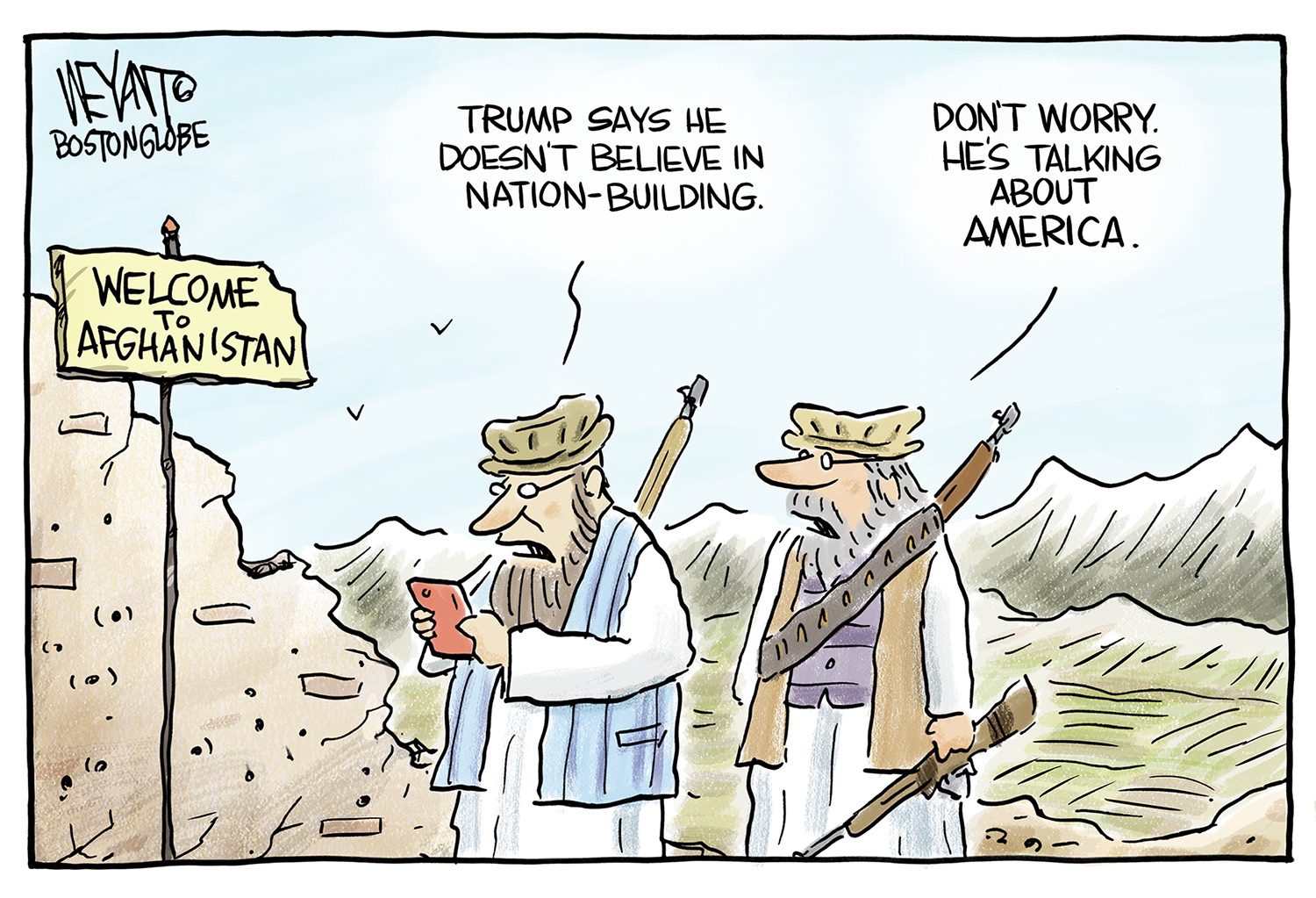BY NYLA ALI KHAN
 President Trump’s address to the nation on Aug. 21, in which he underscored his government’s stance vis-a-vis South Asia, gave me a sense of déjà vu.
President Trump’s address to the nation on Aug. 21, in which he underscored his government’s stance vis-a-vis South Asia, gave me a sense of déjà vu.
The line of demarcation between neoconservatives and neoliberals in the United States is thinner than some people realize. In terms of interventionist politics and foreign policy; support for the ramifications of globalization, some of which are the corporatization of agriculture and structural adjustment programs in the developing world; and being harbingers of peace through preemptive strikes, the two have much in common.
Going back to my sense of déjà vu, subsequent to the disintegration of the Soviet Union in 1989-1990, India lost its powerful ally. India’s relations with the U.S. reeked of distrust and paranoia at the time.
This worsened when senior officials in the first Clinton Administration questioned the legality of the status of Kashmir as a part of the Indian Union. The nonproliferation agenda of the U.S. in South Asia actively undermined India’s proliferation strategy in the early and mid-1990s.
Washington’s agenda was propelled by the fear that South Asia had burgeoning potential for a nuclear war in the future [see “Prepared Statement by John H. Kelly, assistant secretary for Near Eastern and South Asian Affairs before Subcommittee on Asian and Pacific Affairs, House Foreign Affairs Committee”, Nov. 2, 1990].
Pakistan’s policy of abetting insurgents in Kashmir and Afghanistan led to its political insularity and seemingly legitimized India’s proactive approach. The U.S. adopted the policy of persuading both India and Pakistan to actively participate in the nonproliferation regime by agreeing to comply with the Comprehensive Test Ban Treaty [CTBT] and to an interim cap on fissile-material production [“Interview with Strobe Talbott,” The Hindu, Jan. 14, 2000].
Washington’s political volte face became apparent when it explicitly demanded that Islamabad withdraw from occupied Indian positions and maintain the legitimacy of the Line of Control [LOC] in Kashmir. It was implicit in this demand that it saw Pakistan as the egregious aggressor.
In his construction of Pakistan and Afghanistan, President Trump has reduced the two countries to safe havens for terrorists. Although President Trump would have us believe that his government has no intention of telling Afghans how to run their country, military aid – in any way, shape, or form – always comes with strings attached.
Washington’s incrimination of Pakistani’s stance mitigated New Delhi’s fear that internationalization of the Kashmir dispute would spell unambiguous victory for Pakistan. India’s strategy of coercive diplomacy increased the international pressure on Pakistan to withdraw its forces from Indian territory.
India took recourse to limited conventional war under nuclear conditions, prior to President Clinton’s March 2000 visit to New Delhi. At this point in time, proliferation was relegated to the background in Indo–U.S. relations.
The Kashmir issue further receded to the background during the Bush Administration. The neo-conservatives in that administration zeroed in on India as a country in the Asia–Pacific region that would offset China’s burgeoning economy, which I see as an attempt to reconstruct the cold-war paradigm [“‘U.S.–South Asia Relations under Bush,” 2001]. President Trump’s avowed support for further building ties with India in order to enhance its economic and military dominance in the Indo-Pacific region gives the Modi government and its ultra right-wing Hindutva agenda a pat on the back.
U.S. strategic ties with New Delhi were further consolidated in the wake of Sept. 11, 2001, when the links between militant/insurgent groups and Pakistan’s military and militia forces were underscored. As one of the consequences of the decision of the Bush Administration to eliminate Al-Qaeda and its supporters in Afghanistan, Pakistan’s General Pervez Musharaff found himself with no option but to sever ties with the Taliban.
Following this drastically changed policy decision to withdraw political and military support from the Al-Qaeda and the Taliban, Islamabad found itself unable to draw a clear line of distinction between “terrorists” in Afghanistan and “freedom fighters” in Kashmir. Islamabad’s quandary proved New Delhi’s trump card.
New Delhi’s strategy was validated by U.S. military operations in Afghanistan, and the deployment of U.S. forces in and around Pakistan to restrain Pakistani aggression. India was assured by the U.S. that it would stall any attempt by Pakistan to extend the Kashmir dispute beyond local borders, which might disrupt its operations against the Al-Qaeda and the Taliban.
Also, deployment of the U.S. military in Pakistani air bases strengthened New Delhi’s confidence that Islamabad would hesitate to initiate nuclear weapons use. The result of India’s policy of coercive diplomacy was that the Musharraf regime was pressured by the U.S. to take strict military action against the mercenary and militant groups bolstering the insurgency in Kashmir [PBS interview with U.S. Undersecretary of State Richard Armitage, Aug. 30, 2002].
Regardless of the possibility of nuclear restraint in South Asia, a resolution of the Kashmir dispute and insistence on accountability for human rights violations through transitional justice mechanisms would put a monkey wrench in the drive in both countries to beef up their nuclear arsenals. It would also dampen the belligerence of an interventionist American foreign policy, hence my sense of déjà vu.
– Nyla Ali Khan is a member of the Scholars Strategy Network and the author of Fiction of Nationality in an Era of Transnationalism; Islam, Women, and Violence in Kashmir; The Life of a Kashmiri Woman, and the editor of The Parchment of Kashmir. She is editor of the Oxford Islamic Studies’ Online’s special issue on Jammu and Kashmir. She can be reached at nylakhan@aol.com.







